Geography, Environment and Development
Programme Highlights 2023
 |
The 2023/2024 academic year has been an exciting one at GED. First and foremost, our own Associate Professor Ahsan Ullah received the 2022 Research Excellence Award for Senior Career Academics at UBD on 8 June 2023 in recognition for his tireless efforts in research and publication. He received a similar award, Excellence in Research and Creative Endeavors Award 2014, in 2014 from the American University in Cairo (AUC). At UBD, Dr Ahsan leads the research cluster on Migration, Diaspora and Globalization and is the Chief Editor of the faculty journal, Southeast Asian: A Multidisciplinary Journal. |
Apart from several articles, he also published three books in 2023: Governance, migration and security in international relations (joint editor with J. Ferdous); Social safety nets and poverty reduction in developing countries (with Ferdous); The unheard stories of the Rohingyas: Ethnicity, diversity, and media (with D. Chattoraj); and COVID-19 Pandemic and migrant population in Southeast Asia: Vaccine, Diplomacy and Disparity (with Chattoraj).
ASEAN Sustainable Urban Strategy (ASUS), 19-20 June.
Dr. Noor Hasharina Hassan, Mr. Izni Azrein Noor Azalie and Mr. Gabriel Yong were invited by the Commissioner of Town and Country Planning, Dr. Marsit Omar, to participate in Brunei’s preparation to join ASUS, one of the initiatives under the strategic area of Sustainable Infrastructure of the Master Plan on ASEAN Connectivity (MPAC) 2025. It aims to provide ASEAN cities with a sustainable urbanisation framework based on six areas: (i) civic and social; (ii) health and well-being; (iii) security; (iv) quality environment; (v) built infrastructures; and (vi) industry and innovation. It involves using toolkits developed by UN-Habitat to (a) priories actions and (b) develop robust strategies and project proposals. UN-Habitat is the United Nations Human Settlements Programme, mandated by the UN General Assembly to promote socially and environmentally sustainable towns and cities. It works with partners to build inclusive, safe, resilient and sustainable cities and communities and promotes urbanization as a positive transformative force for people and communities, reducing inequality, discrimination and poverty.
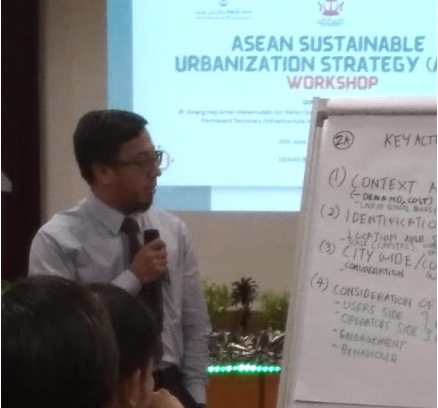
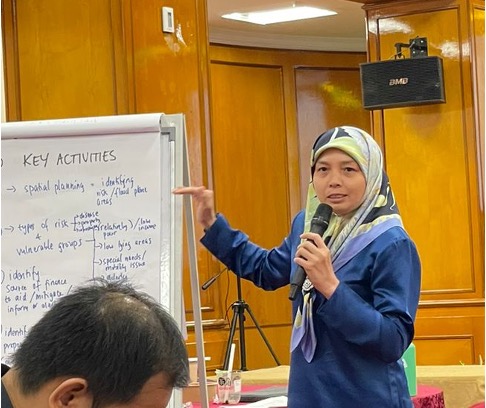
Prior to the main workshop, a framing workshop was held at the Ministry of Development. Gabriel Yong presented a proposal to couch Brunei ASUS within the context of Climate Change and the vulnerable areas along Sungai Kedayan (BSB) and the Mulaut lowlands. It identified resilient transit infrastructure as the main priority, and the importance of self-contained urban systems. The framework was adopted for use in the UB-Habitat workshop on 19-20 June. Participants, which represent various government agencies, businesses and NGOs were asked to submit priority areas for the workshop.
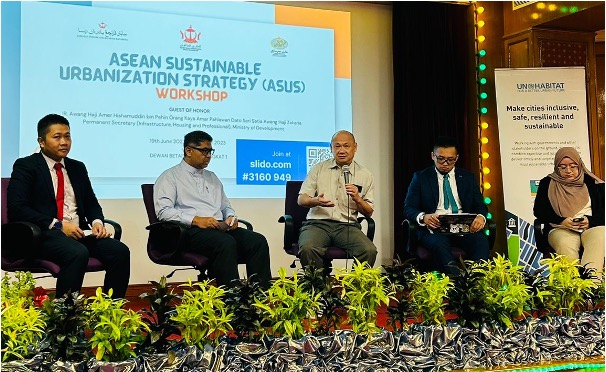
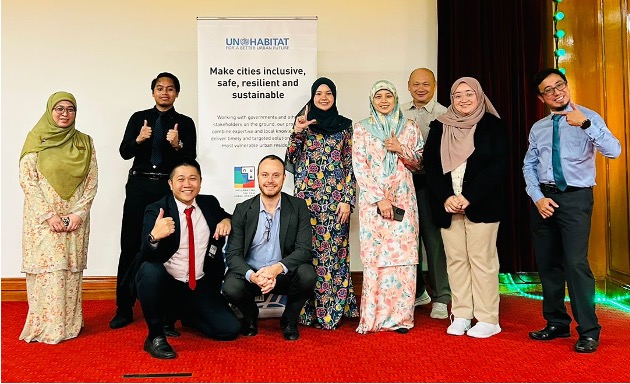
The ASUS workshop was moderated by two experts from UN-Habitat. Mr Riccardo Maroso provided an overview of ASUS, its toolkits and the workshop programme. Together with Mr. Tam Hoang, they facilitated the breakout sessions, simulation exercises, discussions and plenary sessions. A number of UN-Habitat experts provided lectures remotely. Izni and Hasharina moderated the groups on mobility and urban economy respectively, while Gabriel served as panelist on the discussion on success factors and best practice for sustainable urbanisation in Brunei.

GED team with UN-Habitat experts Tam (kneeling, left) and Riccardo (kneeling, right), officers from Town and Country Planning, and Khairunnisa Ashari of Green Brunei (2nd from right).
Asian Undergraduate Symposiums 2023, National University Singapore College (NUSC), 9-22 July.
Mr Izni Azrein Noor Azalie was invited to participate in the annual symposium organised by NUSC, NUS and Temasek Foundation aimed at training future youths of Asian universities. Over two weeks, he and other ASEAN experts presented, shared and provided advisories on current development in their field to a group of students from Asian universities, who were expected to develop projects proposals in groups, the best of which will receive seed funding to kick start their project.
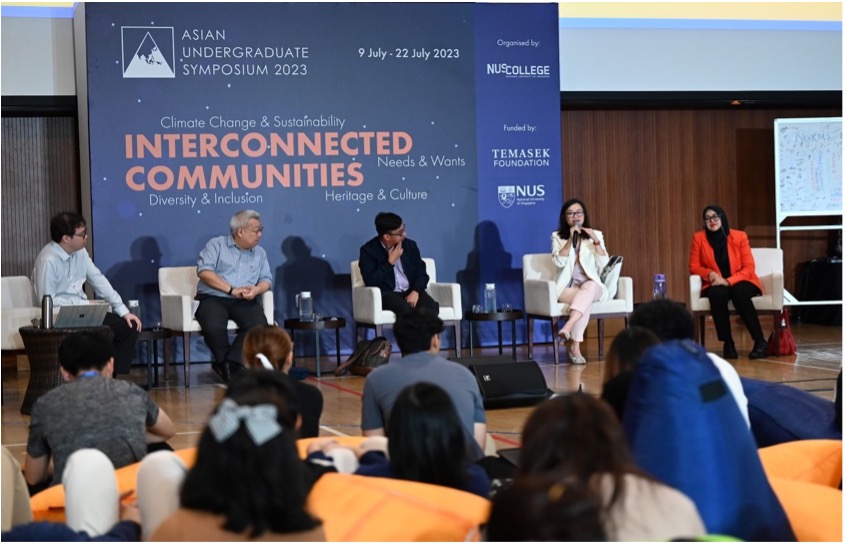
Expert Panel Session on Heritage and Culture, comprising of Adjunct Professor Dr Kevin Tan (NUS), Associate Professor Dr Natalie Pang (NUS), Dr Azianura Hani Shaari (UKM) and Mr Izni Azrein (UBD) with moderator, Associate Prof Loy Hui Chieh, Vice Dean of NUSC.
Prior to the main workshop, a framing workshop was held at the Ministry of Development. Gabriel Yong presented a proposal to couch Brunei ASUS within the context of Climate Change and the vulnerable areas along Sungai Kedayan (BSB) and the Mulaut lowlands. It identified resilient transit infrastructure as the main priority, and the importance of self-contained urban systems. The framework was adopted for use in the UB-Habitat workshop on 19-20 June. Participants, which represent various government agencies, businesses and NGOs were asked to submit priority areas for the workshop.
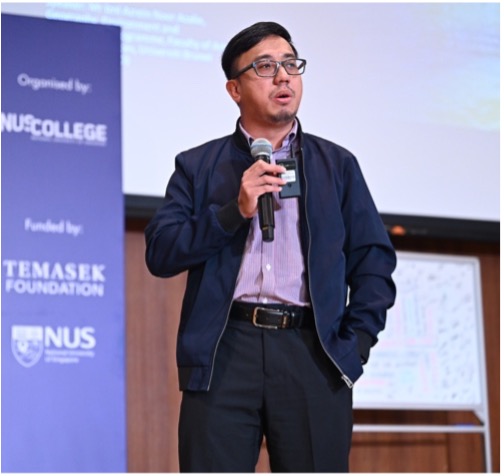
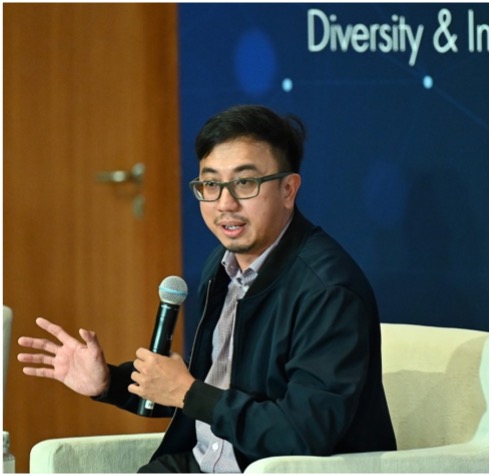
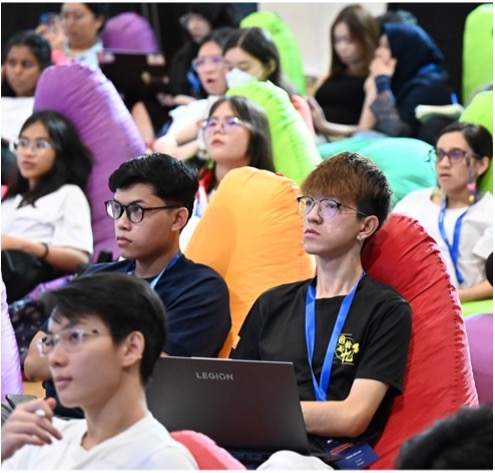
Mr Izni interacting with students from the Asian Universities.
International Symposium “Mobilities among ASEAN and Japan: Its Future and How We Shape It” in Jakarta, 25-26 July.
Dr Siti Mazidah Haji Mohamad, Assistant Professor at FASS and Director for Centre for Advanced Research (CARe), was invited by The Japan Foundation and Institute of Social Science and Humanities, National Research and Innovation Agency (BRIN), Indonesia, to share her work at the Symposium, which commemorates the fiftieth year of ASEAN-Japan friendship and cooperation. Scholars from 10 ASEAN countries and Timor Leste presented papers in 5 panels: (i) Why Mobilities Matters; (ii) Mobilities of People: Students, Workers, Experts and Migrants; (ii) Mobilities in Academic knowledge: Studies on/in ASEAN and Japan; (iv) Mobilities of Culture: Foods, Sports, Entertainment and Arts; and (v) Challenges to Mobilities: How to embrace diversity and create coexistence.
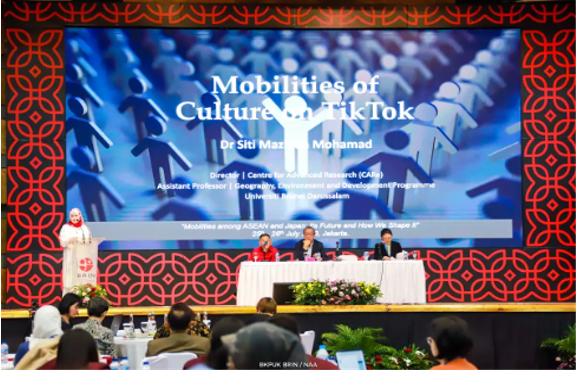
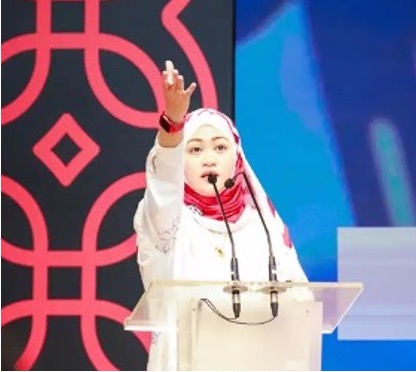
Dr Siti Mazidah presented her research findings on Mobilities of Cultures on TikTok by young people, which is an extension of her work on Cringe Culture, Class Consciousness and TikTok. Dr Siti Mazidah is the Regional Leader for Southeast Asia in the TikTok Culture Research Network (TCRN).
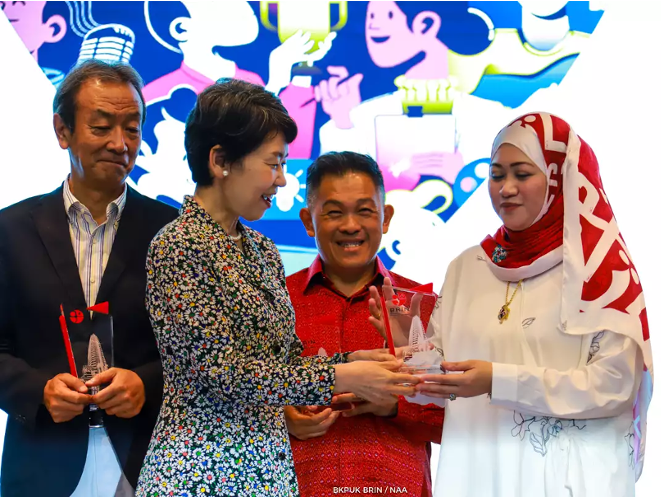
Yuri Sato, Executive Vice President of the Japan Foundation presented an appreciation gift to Dr Siti Mazidah, 26th July 2023, Jakarta.
Opportunity for Capacity Building for Sustainable Coastal Development, Sustainable Ocean Workshop, Xiamen, China, 9 November.
Mr. Gabriel Yong was invited by the Fujian Institute for Sustainable Oceans (FISO), Xiamen University, to speak in a forum at the Sustainable Oceans workshop. The event is part of the World Ocean Week (WOW) held annually in Xiamen since 2005. This year’s theme was New Engine of Blue Development for the Maritime Community with a Shared Future. Among the WOW highlights were the release of the inaugural Capacity Index for Sustainable Coastal Development (CI-SCD) for the countries along the Maritime Silk Roads (MSR) report, as well as the China Ocean Development Index, Digital Deep-Sea Typical Habitats Programme (DEPTH), and the Blue Citizen Initiative. My role was to discuss the results of the CI-SCD report, in which Brunei ranked second, just below Singapore in the composite index. I highlighted inaccuracies due largely to the lack of accurate data in the public domain for countries such as Brunei (and Timor Leste, which was ranked 7th). While the index was conceptually sound, its use of available and accessible global data sets, including remotely sensed data, would not provide accurate measure of capacity for small countries, such as ours. This is because many global datasets, such as Environmental Performance Index (Yale University), Ocean Health Index (University of California Santa Barbara) and World Bank, use proxies for Brunei. The evaluation scale, which is necessarily coarse to accommodate large countries, makes it difficult to compare countries of different areas, population sizes, and complexities. The CI-SCD is however a useful metric, which is in need of further refinement.
FISO, which developed the index, also launched a Sustainable Coastal Development Capacity Building Lab (SCD-CBL) at the workshop. This is an initiative to foster collaborative research to improve monitoring and assessment of sustainable development in countries along the MSR. Given the lack of technical capacity in Brunei for such activity and the fact that Brunei is a coastal state, where the majority of the population, industry and infrastructure is concentrated, this offers an opportunity for collaboration and partnership to build up GED/UBD/Brunei’s capacity for research, monitoring and management for sustainable coastal development. Integrated coastal management was taught in the program (when it was the Geography Department and later Environmental Studies Programme) but has not been offered for many years due to staff shortage. Given the importance of sustainable coastal development to Brunei, especially in anticipation of sea level rise due to Climate Change, it would be prudent for GED to develop a partnership with FISO’s SCD-CBL.
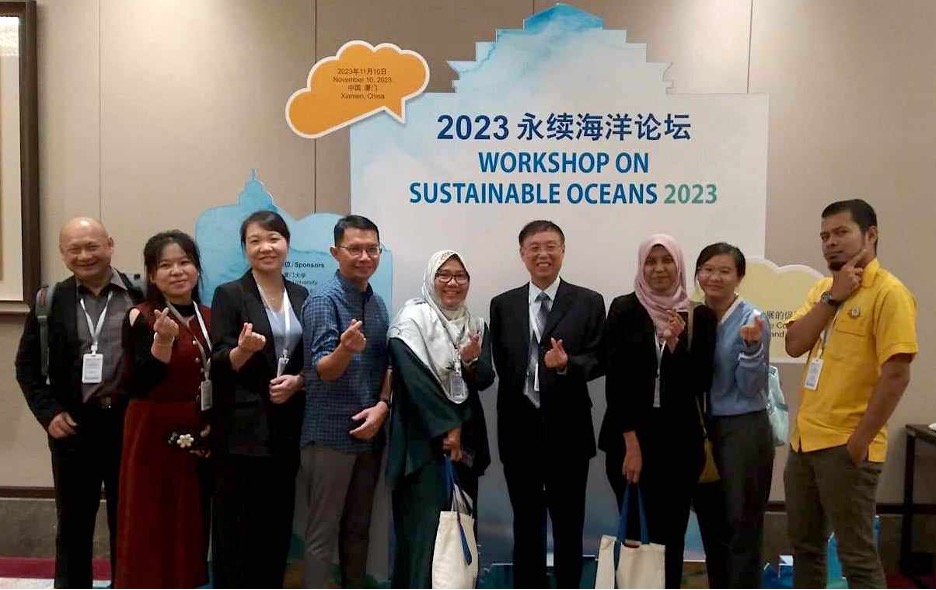
With Prof Xue Xiong-Zhi, Dean of FISO (4th from right) and Phoebe Ye (Coordinator for International Affairs) at Xiamen, 9 November 2023.
